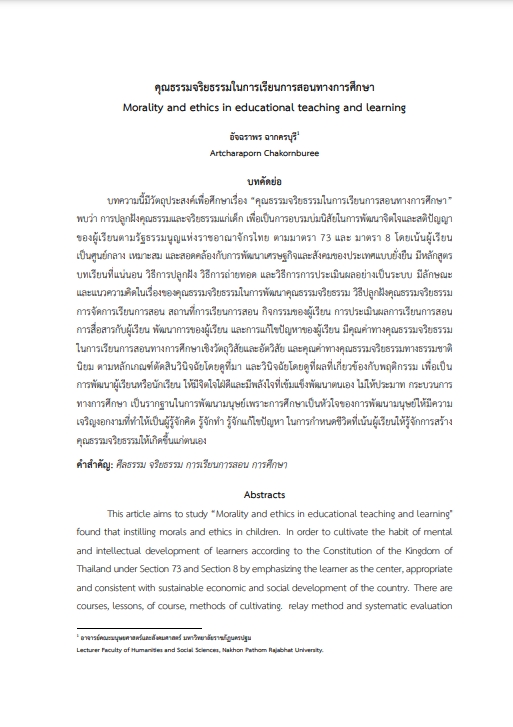Morality and ethics in educational teaching and learning
Keywords:
Morals, ethics, teaching, educationAbstract
This article aims to study “Morality and ethics in educational teaching and learning" found that instilling morals and ethics in children. In order to cultivate the habit of mental and intellectual development of learners according to the Constitution of the Kingdom of Thailand under Section 73 and Section 8 by emphasizing the learner as the center, appropriate and consistent with sustainable economic and social development of the country. There are courses, lessons, of course, methods of cultivating. relay method and systematic evaluation methods with the characteristics and concepts of morality and ethics in the development of
moral ethics, methods of cultivating morals teaching and learning management, teaching location, learner activities, teaching evaluation, communication with learners, learner development, and student problem solving with moral values and ethics in teaching and learning objectives and subjective education; and moral values and ethics in naturalism. according to the criteria to judge by looking at the source and diagnosed by looking at the effects associated with the behavior In order to develop learners or students To have a good heart and strong willpower to develop yourself, not to underestimate the educational process
which is the foundation for human development because education is the heart of human development to have prosperity that makes people know how to think, know how to do, know how to solve problems In setting a life that focuses on learners to know how to create morals and ethics for themselves.
References
กรมการศาสนา. (2541). หลักและวิธีการจัดจริยศึกษา และหัวข้อจริยธรรม สำหรับใช้อบรมสั่งสอนนักเรียนนักศึกษา. กรุงเทพฯ: โรงพิมพ์การศาสนา.
กระทรวงศึกษาธิการ. (2548). คู่มืออบรมหลักสูตรการส่งเสริมสุขภาพจิตและป้องกันปัญหาสุขภาพจิตของประชาชนโดยพระสงฆ์. กรุงเทพฯ: โรงพิมพ์การศาสนา.
กาญจนา นาคสกุล. (2546, กรกฎาคม). ปฏิรูปการศึกษากับปัญหาจริยธรรมในสังคมไทย. วารสารวิชาการ, 6 (7), 2-6.
จำนงค์ อดิวัฒนสิทธิ์. (2545). สังคมวิทยาตามแนวพุทธศาสตร์. กรุงเทพฯ: โรงพิมพ์มหาจุฬาลงกรณราชวิทยาลัย.
เจริญ ภักดีวานิช. (2546). การบริหารจัดการระบบดูแลช่วยเหลือนักเรียน เพื่อพัฒนาคุณภาพชีวิตและแก้วิกฤตสังคม. กรุงเทพฯ: ชวนพิมพ์.
ชำเลือง วุฒิจันทร์. (2524). คุณธรรมและจริยธรรม. กรุงเทพฯ: การศาสนา.
ดวงเดือน พันธุมนาวิน. (2543). ทฤษฎีต้นไม้จริยธรรม: การวิจัยและพัฒนาบุคลากร. กรุงเทพฯ: จุฬาลงกรณ์มหาวิทยาลัย.
ทัศนีย์ ทองสว่าง. (2537). สังคมไทย. กรุงเทพฯ: โอเดียนสโตร์.
นภาพร และคณะ. (2543). รายงานการวิจัยฉบับสมบูรณ์เรื่อง เทคนิคการสอนคุณธรรมสำหรับนักศึกษามหาวิทยาลัยเชียงใหม่. เชียงใหม่: มหาวิทยาลัยเชียงใหม่.
นงลักษณ์ เทพสวัสดิ์. (2543). วิเคราะห์ปัญหาสังคมในสังคมไทย (พิมพ์ครั้งที่ 2). กรุงเทพฯ: มหาวิทยาลัยธรรมศาสตร์.
บุญชม ศรีสะอาด. (2547). การพัฒนาการสอน. กรุงเทพฯ: โรงพิมพ์สุวีริยสาส์น.
บำรุง สุขพรรณ์. (2547). เอกสารประกอบการถวายความรู้พระสงฆ์. หลักสูตร “พระสงฆ์ผู้นำการพัฒนาสังคมไทยที่ยั่งยืน”. กรุงเทพฯ: มหาวิทยาลัยธรรมศาสตร์.
ประภาศรี สีหอำไพ. (2535). พื้นฐานการศึกษาศาสนาและจริยธรรม. กรุงเทพฯ: จุฬาลงกรณ์มหาวิทยาลัย.
พระธรรมปิฏก (ป.อ. ปยุตฺโต). (2541). พุทธวิธีในการสอน. กรุงเทพฯ: มูลนิธิพุทธธรรม.
พระปัญญานันทภิกขุ. (2529). มงคลชีวิตฉบับทางก้าวหน้า. กรุงเทพฯ: บรรณาคาร.
ยนต์ ชุ่มจิต. (2531). ความเป็นครู. กรุงเทพฯ: โอเดียนสโตร์.
รุจิร์ ภู่สาระ. (2543). แบบเรียนแนวหน้าชุดพัฒนากระบวนการหลักสูตรใหม่กลุ่มสร้างเสริมลักษณะนิสัย 6. กรุงเทพฯ: อักษรเจริญทัศน์.
สมภาร พรมทา. (2535). พุทธศาสนากับปัญหาจริยศาสตร์. กรุงเทพฯ: สารมวลชล.
สำนักงานคณะกรรมการการศึกษาแห่งชาติ. (2544). การวัดและประเมินผู้เรียนด้านคุณธรรมจริยธรรม. กรุงเทพฯ: โรงพิมพ์จุฬาลงกรณ์มหาวิทยาลัย.
สุรางค์ โค้วตระกูล. (2553). จิตวิทยาการศึกษา. กรุงเทพฯ: สำนักพิมพ์แห่งจุฬาลงกรณ์มหาวิทยาลัย.
อังคนา ราชสีห์. (2548). การประเมินโครงการโรงเรียนวิถีพุทธ: กรณีเฉพาะโรงเรียนเคหะชุมชนลาดกระบัง. กรุงเทพฯ: คุรุสภาลาดพร้าว.
Aristotle, R. M. (1931). The basic works of Aristotle. New York: Random House.
Wittgenstein. L. (1963). Philosophical investigations. Oxford: Blackwell.

Downloads
Published
How to Cite
Issue
Section
License
Journal of Humanities and Social Sciences Nakhon Pathom Rajabhat University





